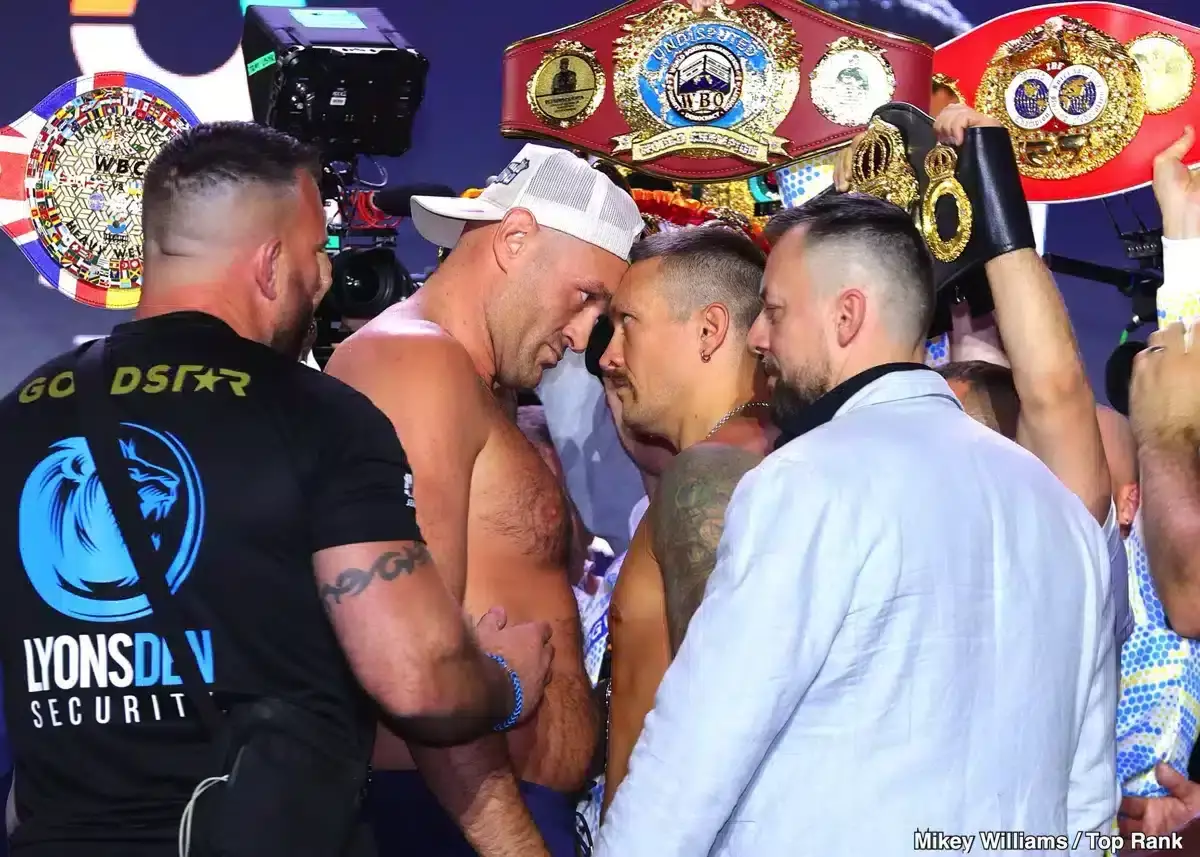The idea of a third confrontation between Oleksandr Usyk and Tyson Fury has captivated boxing fans and critics alike — yet it remains clouded in ambiguity and rhetorical posturing. Fury’s bold declaration that he would only return for a third fight with Usyk signals a mix of bravado and strategic marketing. Still, the reality on the ground paints a different picture; complex scheduling conflicts, ongoing commitments, and genuine doubts cast shadows over this potentially iconic matchup. This isn’t simply about settling scores—it’s about the legacy of two fighters seeking validation and greatness, but whether those aspirations align with reality is up for debate.
Fury’s recent social media post, announcing a hypothetical trilogy fight set for April 2026 at Wembley Stadium, reeks of showmanship. The timing and content call into question whether Fury is attempting to reignite the rivalry for publicity or firmly rooting for an actual contest. The message seems calculated to keep his name in the public consciousness, especially as negotiations with Usyk remain unconfirmed. Meanwhile, Usyk is preparing meticulously for his July 19 bout against Daniel Dubois, underscoring the fact that he remains laser-focused on upcoming challenges rather than fantasy matchups. It’s a reminder that, in boxing, aspirations often collide with logistical realities.
Even if Fury’s words are genuine—an open possibility—the challenge lies in orchestrating a third bout when both fighters are committed elsewhere. Usyk’s team has expressed openness, indicating that the possibility is “on the table” after their current fight. Yet, optimism must be tempered with pragmatic concerns. The heavyweight landscape is crowded, and fighters often prioritize rematches or defenses that secure their championship reigns before contemplating legacy-defining battles. Establishing a date for this trilogy might serve Fury’s narrative, but without concrete plans, it remains a distant dream, not imminent reality.
The Stakes Are Bigger Than Money — Or Are They?
The allure of a third Fight between Usyk and Fury extends beyond financial gains, tapping into the deep desire for historical validation. For Usyk, snaring a victory over Fury once and for all could cement his status as one of the greatest heavyweights of his era. His pursuit of becoming a three-time undisputed champion reflects ambition rooted in legacy rather than mere monetary incentive. Yet, the colossal pay-per-view and ticket sales that such a fight would generate cannot be dismissed as secondary motivators; they are central to the sport’s economics today.
Fury, on the other hand, has long used brash bravado as currency, manipulating the media narrative to remain relevant. His repeated insistence that he was unfairly robbed in their previous encounters hints at underlying frustrations and a desire for redemption—whether genuine or strategic. But is this incessant talk of a trilogy a sincere career move or just another chapter in Fury’s circus of self-promotion? His penchant for creating controversy has often overshadowed substantive plans, and skeptics question whether he truly intends to step into the ring again with Usyk or is simply stringing along fans and promoters alike.
That said, the potential fight carries tangible stakes: the opportunity to claim definitive supremacy in a division historically marked by chaos and great fighters. An Usyk victory over Fury would redefine the heavyweight landscape, sending shockwaves through the sport. Conversely, Fury capturing a win could reset his narrative, cementing his legacy as the fighter who finally conquered the Ukrainian champion. Ultimately, the duel promises to serve as a platform for legacy building, but whether it materializes remains an open question.
The Reality Check: Is It Ever Really Going to Happen?
While the hype is colorful and the stakes are elevated, reality imposes strict limitations. The timeline proposed by Fury for 2026, seemingly distant and speculative, suggests that he is hedging his bets or possibly just teasing fans. The current focus of Usyk and his team, centered on July’s bout with Dubois, highlights that the heavyweight scene does not pause, even for the most tantalizing rivalries.
Furthermore, the notion that Fury would wait years to fight again—if he is serious—is problematic. Fighters often prefer quick turnarounds or immediate rematches to maximize momentum, not prolonging rivalry into the distant future. Fury’s history of unpredictable behavior and media manipulation makes it difficult to take his declarations at face value. There might be a hint of nostalgia or craving for a major payday, but the truth is that aligning schedules, negotiating terms, and maintaining motivation for such a long-term goal is inherently challenging.
Usyk’s recent statements reveal a pragmatic approach—focus on the upcoming fight and then assess options post-victory. This leaves the door open but clearly indicates that immediate plans do not currently include Fury. For the fight to happen, both parties need to prioritize and commit, which, given the sport’s nature, is much easier in theory than in practice. Real life has a way of complicating even the most promising fights, and that’s what makes the idea of a Fury-Usyk trilogy both intriguing and improbable in the near term.

